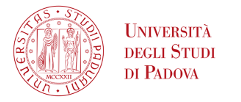
“MacWilliams identities for codes over rings”
Martedì 30 Aprile 2024, ore 17:00 - Aula 2AB40 - Giulia Cavicchioni (PhD candidate Università di Trento)
Abstract
Although the weight distribution doesn’t fully characterize a code, it provides significant information. Research in this area starts with MacWilliams’ work in 1963, where she proved the famous MacWilliams identities. These identities establish a relation between the Hamming weight enumerators of a linear code over a finite field and its dual.
In the past few decades, the MacWilliams identities have been proven to hold for other metrics too, such as the rank metric or the sum-rank metric. When considering codes over finite chain rings, the Lee metric or the Homogeneous metric are natural choices to endow the alphabet with. The classical MacWilliams identities do not hold for these metrics (apart from certain specific situations) due to the lack of knowledge about the zero positions of codewords for a fixed weight, which means that the Krawtchouk coefficients are not well-defined. To overcome this issue, we can choose a different approach to partition the ambient space.
In this talk, we will partition the ambient space based on a natural decomposition that stems from the definition of the metric considered. This partition allows us to easily compute the weight of its elements and it gives rise to well-defined Krawtchouk coefficients in each case. Hence, MacWilliams-type identities based on the corresponding decomposition do exist.




